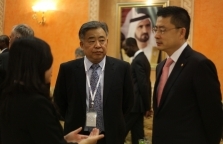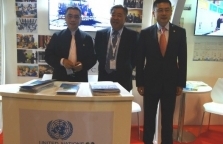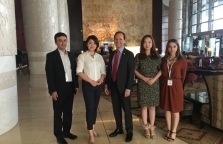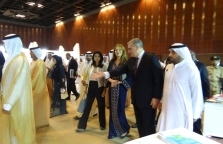On October 31, 2016, the Financial Center for South-South Cooperation (FCSSC), as a participant in the 9th Session of the Global South-South Development Expo (GSSD) organized by the United Nations Office for South-South Cooperation (UNOSSC) in Dubai World Trade Center, shared its experience on South-South cooperation with hundreds of senior representatives from more than 20 UN agencies and 90 UN member states around the world. Mr. Zhang Zhiping and Ms. Zhang Jirong, respectively FCSSC’s Executive President and Deputy Director-General, attended the Expo and gave speeches at the plenary session.
Since its establishment in 2008, the GSSD Expo has actively presented and promoted to the world hundreds of partner countries, UN agencies, enterprises and civil society organizations. With a duration of four days and under the theme “South-South Cooperation: Enhancing innovation towards achieving the 2030 Agenda for Sustainable Development”, this year’s Expo was featured by deep discussions and presentations on the relationship between sustainable development and various factors such as climate change, private sectors, agriculture and energy.
In February 2016, Mr. Jorge Chediek, Director of the UNOSSC invited FCSSC to attend the GSSD Expo during his meeting with Dr. Wu Zhong, Director-General of FCSSC.
During the Expo, Ms. Zhang Jirong, along with Mr. David Galipeau, Global Chief of the United Nations Social Impact Fund (UNSIF), Mr. Tan Xiangdong, Vice President and CEO of the Hainan Airline Group (HNA), Mr. James Donovan, Chairman of Global CEO Alliance, and other influential business elites, gave a speech at the plenary session on “the 2030 Agenda and the evolving dynamic role and contribution of the private sector and the catalytic role of the UN system in sustainable development”, discussing how private sectors can benefit stakeholders in the global South in terms of knowledge, technology, investment and expertise as well as how corporates should balance their commercial interests and social responsibilities.
In her speech, Ms. Zhang Jirong suggested that mechanisms should be established to encourage private sectors to take part in South-South cooperation. In particular, she emphasized that criteria must be set up to realize concrete measurement on monetary return and social return, as business that only targets money is not deemed a good one. From her perspective, in order to implement the UN Sustainable Development Goals (SDGs), we need to unleash the strength of impact investment and employ different means such as government encouragement and social recognition to raise the awareness of stakeholders in private sectors on what positive social impacts their investment can make. Yet, how can governments and people know the pros and cons of impact investing? Concrete criteria for assessment have to be established and this is the very cause in which both FCSSC and UNSIF are currently committed. In addition to their joint efforts in defining measurement for the quality and quantity of “social impact”, the two institutions have jointly set up the “UN Social Impact Fund – South-South Cooperation Fund” as an investment & financing platform to channel private capital to emerging and frontier markets by utilizing conventional development financing, charitable donations and corporate social responsibility budgets, so as to achieve the sustainable development of economy, environment and society as a whole.
As an integral platform set under the United Nation’s Sustainable Development Agenda framework, which specializes in production capacity cooperation, development experience exchange and financial services, the FCSSC has attracted wide attention at the Expo. Many government agencies and civil society groups, including the African Department of the UNOSSC, Colombian Presidential Agency of International Cooperation (CPAIC) and Dubai FDI, came to the stand of FCSSC to consult its missions and success cases while seeking to establish contacts.
Among others, the CPAIC asked for an individual meeting with the FCSSC in particular. After a brief introduction of each other’s profile, the two parties appreciated each other’s performance in South-South cooperation and expressed willingness to enhance cooperation. The FCSSC stated that its first “South-South Education Program for Economics and Finance” had welcomed participants from the Brazilian Ministry of Foreign Affairs. Thus, it expected more Latin American senior officials and executives in economic and financial sectors to come to this program that is annually hold in PBC School of Finance, Tsinghua University to help developing countries train their financial elites, hoping that this could serve as a starting point for the cooperation between FCSSC and CPAIC. In response, Mr. Alejandro Gamboa, Director-General of the Colombian side, showed great interest and willingness for participation, while mentioning their own South-South cooperation project in China – the “Colombia-Asia Professional Internship Scheme”, which selects qualified Colombian candidates for internship opportunities in Asian companies to learn SME development experience and entrepreneurship. Mr. Alejandro Gamboa stated with great enthusiasm that his Agency can invite FCSSC to select candidates in Colombia.
Apart from conference speeches, stand presentation and bilateral meetings, the FCSSC also actively coordinated invitation, venue setup, logistic arrangement and other issues for the HNA Group, through which the two parties further consolidated their partnership.





